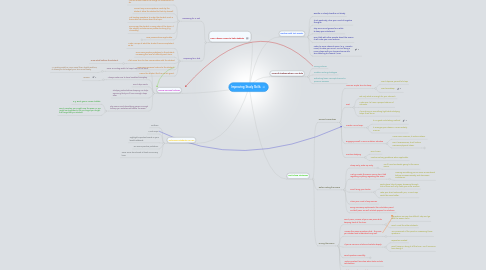
1. Giving personal advices
1.1. Have an analog watch to keep track of the time.
1.1.1. An analog watch is more visual than digital watches; it allows you to budget your time more easily.
1.2. Always make sure to have breakfast everyday.
1.2.1. Reason
1.3. Don't skip meals.
1.4. Studying notes before sleeping can help, assuming that you'll have enough sleep after.
1.5. Play some mind-stimulating games, enough to keep you entertained before the exam.
1.5.1. e.g. Brick game, Frozen bubble
1.5.2. Don't overplay; you might miss the exam or you might be engrossed a lot you forget you forget the things that you studied.
2. Peer Advisor's ways to help students
2.1. Reviewing for a Test
2.1.1. Ask the student about the things he understood, so far.
2.1.2. Correct any misconceptions made by the student, allow the student to think by himself.
2.1.3. Ask leading questions to make the student reach a favourable conclusion about the topic.
2.1.4. Encourage the student in every step of the topic, if the subject includes some problem solving (e.g. Chemistry)
2.1.5. Give praises where applicable.
2.1.5.1. The student gets to solve the problem on his own.
2.1.5.2. The student understands at least a part of the major topic, and learns some new strategies in solving.
2.2. Preparing for a test
2.2.1. Make a recap of what the student has accomplished, so far.
2.2.2. Give more practice problems to the student, increasing the level of difficulty each time.
2.2.3. Allot some time for free conversation with the student
2.2.3.1. Know what bothers the student.
2.2.4. Give some personal advice to the student.
2.2.5. Assure the student that he can do good.
3. Techniques students can use
3.1. Outlines
3.2. Mind maps
3.3. Highlight important words in your book/notebook.
3.4. Do some practice problems.
3.5. Have some time break at least once every hour.
4. Test-taking strategies
4.1. General Procedures
4.1.1. Have an ample time to sleep.
4.1.1.1. Don't deprive yourself of sleep
4.1.1.2. Dont oversleep
4.1.2. Diet
4.1.2.1. Eat only what is enough for your stomach.
4.1.2.2. Make sure to have a proper balance of nutrients.
4.1.2.3. If munching on something light while studying helps, then do so.
4.1.3. Create a mind map.
4.1.3.1. It's a great note-taking method
4.1.3.2. It arranges your ideas in a more orderly manner.
4.1.4. Engage yourself in some outdoor activities
4.1.4.1. Have some exercise; it reduces stress.
4.1.4.2. Don't overexercise; it will induce excessive physical stress.
4.1.4.2.1. Too much physical stress can consume the much-needed time for studying.
4.1.5. Practice studying
4.1.5.1. Don't cram.
4.1.5.2. Practice solving problems when applicable.
4.2. Before Taking the Exams
4.2.1. Sleep early; wake up early.
4.2.1.1. You'll have less hassle going to the exam venue.
4.2.2. Just go inside the exam venue; don't talk regarding anything regarding the exam.
4.2.2.1. Hearing something you're never encountered before increases anxiety and decreases confidence.
4.2.3. Don't bring your books.
4.2.3.1. Books have lots of pages; browsing through lots of them will only make you more anxious.
4.2.3.2. Take your short notes with you; a mind map would be even better.
4.2.4. Clear your mind of any worries.
4.2.5. Bring necessary implements, like calculator, pencil and ball pens, as well as blank papers for solutions.
4.3. During the Exams
4.3.1. Don't panic; answer at your own pace while keeping track of the time.
4.3.1.1. If questions are way too difficult, skip and go with the easier items.
4.3.1.2. Don't mind the other students.
4.3.2. Answer the easier questions first - the ones you studied and understood very well.
4.3.2.1. You're assured of the points in answering those questions..
4.3.3. If you're nervous, inhale and exhale deeply.
4.3.3.1. Repeat as needed
4.3.3.2. Don't keep on doing it all the time. You'll consume time doing it.
4.3.4. Read questions carefully.
4.3.4.1. Be careful about the directions; answer in the format specified in the directions.
4.3.5. Write important formulae when tests include calculations.
4.3.6. Ask for scrap when needed.
